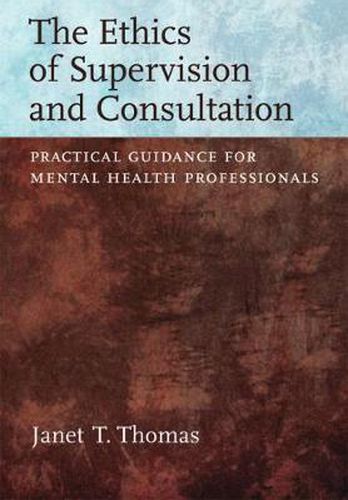Readings Newsletter
Become a Readings Member to make your shopping experience even easier.
Sign in or sign up for free!
You’re not far away from qualifying for FREE standard shipping within Australia
You’ve qualified for FREE standard shipping within Australia
The cart is loading…






Clinical supervision and consultation have long been considered\nintegral elements of training and maintaining competency for\npsychologists and other mental health professionals. One of the\nprimary responsibilities of supervisors is to help with the\nprofessional socialization of supervisees; instilling in them an\nunderstanding of the relevant ethical principles and standards is a\nsignificant component of this charge.
\n
Although students may have considerable knowledge from graduate\ncourses in professional ethics, only in the context of clinical\nwork do the nuances and complexities of ethical issues begin to\nemerge. Supervisors must be present and attentive to capture and\nfully utilize those proverbial \“teachable moment\” in which the\napplications of ethical principles and standards may be recognized\nand internalized. The potential for misunderstanding and\nmisapplication is significant for novice clinicians.
\n
Even seasoned professionals are vulnerable to ethical errors\ncaused by other factors such as mismanaged countertransference,\nlack of knowledge about evolving standards, and personal problems\nthat compromises objectivity and effectiveness. Supervisors and\nconsultants must provide the guidance necessary to protect the\nwelfare of clients, educate supervisees, and facilitate the\nprofessional development of consultees.
\n
The Ethics of Supervision and Consultation: Practical Guidance\nfor Mental Health Professionals represents the confluence of ethics\nwith supervision and consultation. Supervision and consultation are\ntreated as discrete areas of specialization. Ethics codes and\nspecialty guidelines are analyzed in terms of their applications to\nthis work. Supervisors and consultants are provided with both\ntheoretical concepts and practical strategies for incorporating\nethical principles into their work.
\n\n
$9.00 standard shipping within Australia
FREE standard shipping within Australia for orders over $100.00
Express & International shipping calculated at checkout
Clinical supervision and consultation have long been considered\nintegral elements of training and maintaining competency for\npsychologists and other mental health professionals. One of the\nprimary responsibilities of supervisors is to help with the\nprofessional socialization of supervisees; instilling in them an\nunderstanding of the relevant ethical principles and standards is a\nsignificant component of this charge.
\n
Although students may have considerable knowledge from graduate\ncourses in professional ethics, only in the context of clinical\nwork do the nuances and complexities of ethical issues begin to\nemerge. Supervisors must be present and attentive to capture and\nfully utilize those proverbial \“teachable moment\” in which the\napplications of ethical principles and standards may be recognized\nand internalized. The potential for misunderstanding and\nmisapplication is significant for novice clinicians.
\n
Even seasoned professionals are vulnerable to ethical errors\ncaused by other factors such as mismanaged countertransference,\nlack of knowledge about evolving standards, and personal problems\nthat compromises objectivity and effectiveness. Supervisors and\nconsultants must provide the guidance necessary to protect the\nwelfare of clients, educate supervisees, and facilitate the\nprofessional development of consultees.
\n
The Ethics of Supervision and Consultation: Practical Guidance\nfor Mental Health Professionals represents the confluence of ethics\nwith supervision and consultation. Supervision and consultation are\ntreated as discrete areas of specialization. Ethics codes and\nspecialty guidelines are analyzed in terms of their applications to\nthis work. Supervisors and consultants are provided with both\ntheoretical concepts and practical strategies for incorporating\nethical principles into their work.
\n\n